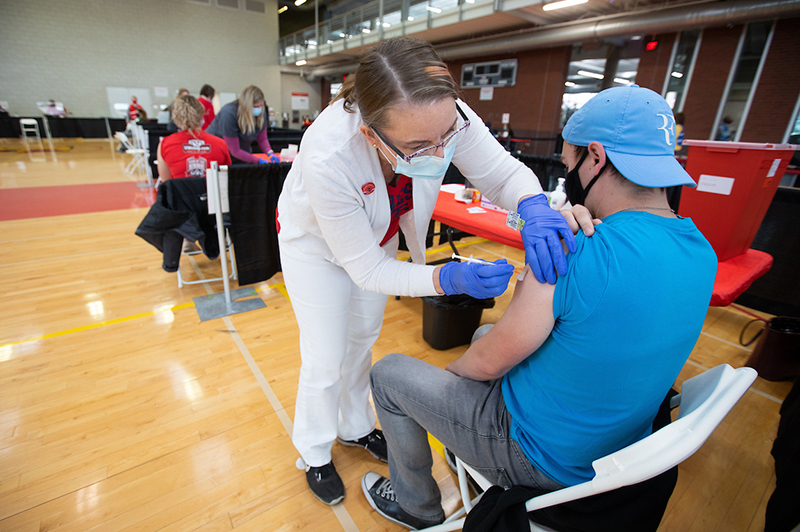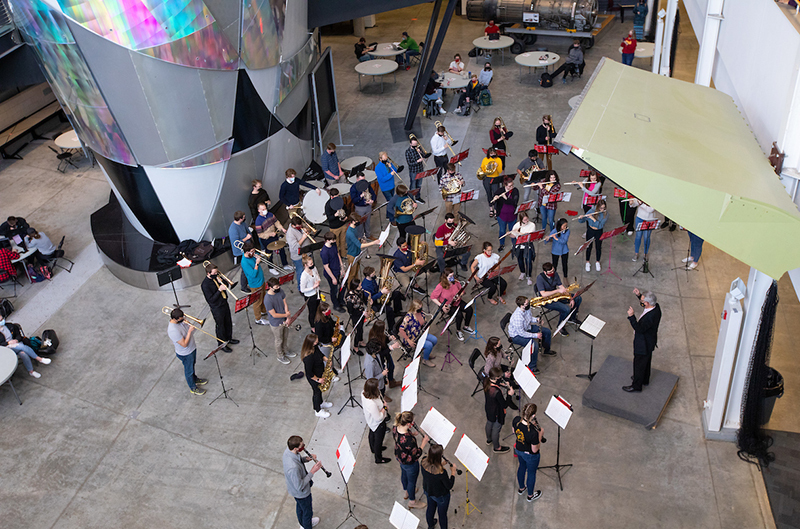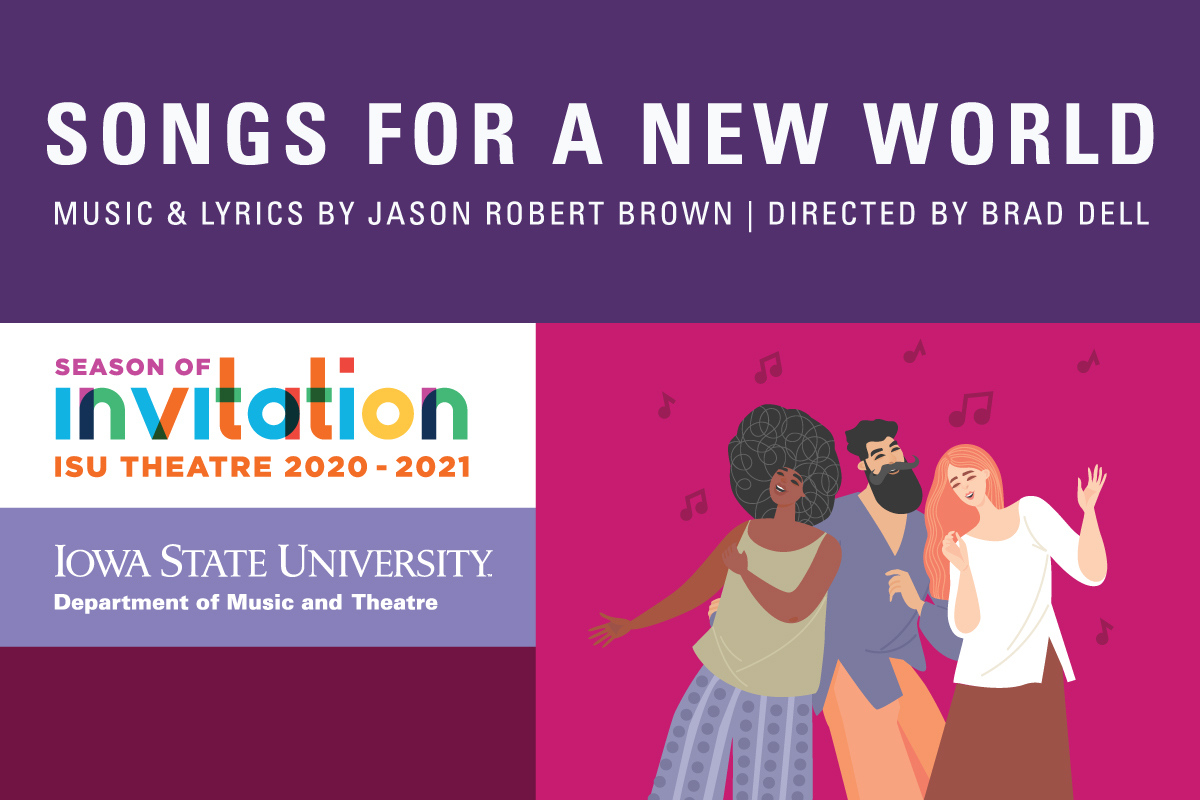Employees can schedule vaccination appointments

Photo by Christopher Gannon.
Margaret Evans, a physician in occupational medicine, administers a COVID-19 vaccine to graphic design senior Ivan Rasmussen last week at the university's mass vaccination clinic in State Gym's south basketball courts.
As of this week, all university students and employees are invited to schedule a vaccine appointment at the clinic. Appointments currently are available Tuesday-Thursday, April 27-29, with second doses to follow on May 18-20 (the second appointment is scheduled during the registration process at the first appointment). Those securing appointments must be available to receive both doses on campus.
Future clinic dates will be scheduled based on vaccine availability, and those updates will be posted on the COVID-19 vaccination website. University employees who volunteered to assist at the clinic are reminded to report for their shifts unless they receive notice of a change.
Senior leaders: Plan on returning to campus offices by August
In anticipation of a fall semester that's as close to pre-pandemic "normal" as possible, faculty and staff should make plans to return to their campus offices in August -- Aug. 2 for staff and Aug. 19 for faculty. President Wendy Wintersteen and senior vice presidents Jonathan Wickert (academic affairs), Toyia Younger (student affairs) and Pam Cain (operations and finance) shared some early thoughts for fall in an April 19 memo to all employees. By fall, the health risk to ISU employees and students should be significantly less, they wrote.
Learn more
University human resources FAQ supplements April 19 memo
"We feel confident that the increased availability of the COVID-19 vaccine and appropriate health practices will make it possible for faculty and staff to perform their work safely at their regular campus workplaces," they wrote. In-person instruction will be the default this academic year.
In a separate April 19 memo to faculty, Wickert noted the flexibility faculty have always enjoyed in their work schedules will continue. Virtual meetings, he wrote, are appropriate for activities such as research collaboration meetings, seminars and departmental and committee meetings -- and may improve both attendance and work-life balance. He encouraged faculty to meet students in person for activities such as office hours, academic advising, team-based projects, thesis committee meetings and supervision of their grad assistants.
Getting there
Senior leaders noted that the timing of the memo is intended to give employees and their families time to plan for the new expectations. Faculty and staff are invited to ask questions about the changes during the next town hall with senior leaders on Thursday, April 29 (1-2 p.m., via Webex). They also encouraged employees to talk to their supervisors with any unit-specific questions about returning to campus.
Senior leaders said several changes will support the transition:
- Updated university guidelines for mitigating COVID-19 in the workplace will be shared this summer.
- While it won't conclude this summer, the process of developing university policies for flexible work arrangements, which began in 2019 and continued during the pandemic, is expected to wrap up this fall. Until a new program is announced, supervisors shouldn't implement any flexible work arrangements.
- Requests to work remotely beyond Iowa borders once again will require approval from the appropriate senior VP and Wintersteen. A "significant and compelling business reason" must be demonstrated.
- COVID-19 Alternative Work Arrangements expire June 30 and won't be offered for the 2021-22 academic year. Options for remote work include existing leave policies and disability accommodations for conditions recognized in the American with Disabilities Act (see ISU's Reasonable Accommodations for Employees and Applicants disability policy).
In his memo, Wickert said the past year's practice of "double teaching" courses -- both in person and online for different groups of students -- was appreciated but not sustainable, and instructors should plan to return to the prepandemic teaching mode for each course. Changes to those prepandemic formats will be limited and must be requested by June 1 and approved by the department chair and associate dean.
Stay tuned
Senior leaders said more information will be shared this spring and summer as decisions are made. The Moving Forward Coordinating Committee is collaborating with the university's COVID-19 working groups to prepare the campus community for a fall semester that more closely resembles 2019 than 2020.
"Every member of the ISU community plays an important role in supporting our students and advancing our teaching, research, and extension and outreach programs. We can't wait to see you back on campus!" they concluded.
Not your usual concert stage

Photo by Christopher Gannon.
Unsuspecting occupants and visitors to Howe Hall last Friday morning were treated to a 45-minute indoor concert by Iowa State's Symphonic Band, including performances by its woodwind and brass choirs. Professor of music Michael Golemo directs the band. After a year of practicing in small groups, April 16 marked the band's first concert of the year. Initially scheduled outdoors on the library quad, the event was chased indoors by a fickle April forecast.
Intensive intervention program helps 'at-promise' CALS students
Some might call the students in the College of Agriculture and Life Sciences (CALS) SMART Steps program "at-risk." Audrey Kennis prefers "at-promise."
"These are students with tremendous promise, but structurally we didn't have systems nimble enough to meet their needs," said Kennis, the college's retention coordinator.
Providing the needed structure for academically struggling students is the goal of the SMART Steps. The program, an acronym for Student Management and Academic Response Team, launched in spring 2019 to provide holistic support to CALS students whose extenuating circumstances left them at risk for academic dismissal. Kennis appreciated that the university took students' circumstances into consideration to allow them to remain in school, but felt that these students deserved support to ensure that their second chances would lead to academic success and not simply more debt.
For the past two years, a reprieve from academic dismissal has come with placement in SMART Steps, a holistic intervention designed to identify and remove barriers impacting students' academic performance. It's made a world of difference for students such as Lynn Bohn, who was in the first SMART Steps cohort and is now one of the program's coaches.
"It was like an angel had come to visit me, honestly. It was amazing. It was exactly what I needed to propel my personal growth and success as an undergrad," said Bohn, now a master's student in sustainable agriculture.
How it works
Kennis thinks of SMART Steps as wraparound care, a multifaceted and individualized support system for addressing the obstacles blocking a student from succeeding. In addition to academic skill development, that could involve a fresh look at financial aid, connecting with mental health resources or even reviewing the details of a student's morning routine.
"We ask very direct questions," Kennis said. "We have to get at the root causes, which are often noncognitive factors."
The program's requirements are straightforward but intensive:
- Meet with Kennis or a SMART Steps coach for weekly one-on-one and group study sessions
- Attend at least three coaching sessions offered by the Academic Success Center (ASC)
- Use free ASC tutoring for at least one class
- Maintain their schedule in a planner
- Complete monthly report forms for each class, which instructors must sign
The most beneficial aspect of the regimen, the program's core, is the weekly meetings, Kennis said. During the first meeting, students set specific goals for the semester. In subsequent sessions, as they develop a rapport with students, coaches work with them on how to stay on track.
"That's the secret sauce, I think. It's high-touch," she said.
The required regular contact with instructors is essential, too. Kennis said students at first dread the academic report forms. But it encourages them to network and self-advocate, emphasizing what many students don't realize: Faculty are here to support them.
"This is completely new for them, and it's really helpful," she said. "They start to see that people want them to be successful."
For Bohn, a first-generation student who came to Iowa State after a stint at a two-year college, ISU faculty seemed intimidating. She was surprised to learn, through the interactions needed to get her SMART Steps forms signed, that her instructors were more interested in helping than judging. It's an insight she stresses in her coaching.
"The key component of becoming successful was making those connections with professors," she said.
Positive results
In its spring 2019 trial run with 16 students, 75% of participants completed the program in good academic standing, averaging nearly a full grade point better than students on an academic dismissal waiver who weren't in SMART Steps, Kennis said. Roughly the same completion rate has held as the program expanded to include students re-entering college after an academic dismissal and those recommended by advisors or faculty.
"It's been phenomenal," she said. "These are students who weren't supposed to be here."
With the help of graduate assistants serving as program coaches, SMART Steps has had about 70 students at its peak and is serving more than 40 students this semester. During the pandemic, the program has been entirely virtual, which has been smoother than Kennis expected.
"I think people have been so desperate to connect in any form or fashion that it's worked. Attendance has almost been better this year than when we were in person," she said.
Coping with the disruptions of COVID-19 also has driven home the need for empathy, Kennis said.
"It humanized the experience in a lot of ways instead of it being transactional. We needed grace, too, as we worked to figure things out," she said.
What's next
There's no other comparable college-based or campuswide retention intervention initiative for a general population, Kennis said. She designed it in part by borrowing aspects of tools the athletics department and the TRIO program uses to boost the chances of academic success.
"That's the first thing I thought of: Who has to demonstrate accountability?" she said.
Bohn said she knows similar programming could have a big impact if it was offered to more students.
"If what we are doing was implemented across campus, I know everyone involved would have a better quality of life," she said.
Kennis said there has been some interest in the program from other colleges and central units, though nothing is in the works yet. Within CALS, she hopes to see SMART Steps expand to include students as soon as they land on academic warning.
"Right now, we're not getting them until they're already in academic jeopardy," she said. "We want to get them more on the front end, and we're working to figure out how to do that."
Wickert presents promotion and tenure information to senate
Senior vice president and provost Jonathan Wickert presented his annual report on faculty advancement, which included decisions on 72 cases for promotion and/or tenure during the April 20 Faculty Senate meeting.
Among them, 51 faculty were promoted to associate professor with tenure, 17 tenured faculty were promoted to full professor and one associate professor earned tenure. Two cases were not approved and one case was given a two-year extension.
The promotion and tenure cases granted were split between males and females, 36-33. Among those granted tenure and promotion, 43 are white/Caucasian, 23 are Asian/Asian-American, two are multiracial and one is Latino/a or Hispanic.
The bulk of the cases considered were from a large cohort of 123 faculty hired in 2015, of which 101 were tenure-eligible and 22 were hired with tenure. Among the tenure-eligibile, as of this month, 53 cohort members are tenured, 15 have extended tenure clocks, 10 have extended tenure clocks due to COVID-19, 21 left ISU before receiving tenure, one left ISU with tenure and one moved to a term appointment.
Wickert said promotions for 45 of 46 term faculty were approved.
U.S. diversity requirement
Senators will vote in May on proposed changes to the U.S. diversity requirement. From among several working documents, they voted to work with the academic affairs council's version, which would change the number of learning outcomes for students from five to four. As proposed, students would successfully demonstrate an understanding of all four outcomes and how categories like race, ethnicity and gender have historically excluded marginalized groups.
"The U.S. diversity requirement has had no major changes since it was first implemented in the 1990s," said Sarah Bennett-George, chair of the academic affairs council. "[The changes] bring it to a much more modern understanding and more rigorous review in order to have the U.S. diversity tag to have our students fulfil the requirement."
Term faculty advancement
The senate will vote at the next meeting on changes to the Faculty Handbook to add consistency and minimum standards to the advancement process for term faculty. The clarifications add:
- An advancement schedule and credit for prior service
- Documentation for advancement review
- Roles and responsibilities for candidates, administrators and committees
- Communication after each step of the process
- Rank advancement expectations
- Clarity of prior service credit
- The process for each level of advancement
- Establishment of an appeal process
Other business
In other senate business:
- Senators will vote next month on a master of health care analytics and operations in the Ivy College of Business. The 30-credit program would be delivered primarily online for working health care professionals. The COVID-19 pandemic highlighted the need for improved understanding of health care operations, supply chains and data.
- Diane Al Shihabi (interior design) was elected chair of the faculty development and administrative relations council, Tim Day (biomedical sciences) was elected chair of the judiciary and appeals council and Ann Oberhauser (sociology) was elected chair of the resources policies and allocations council. Each term is two years.
Senators also approved:
- Changes to the Faculty Handbook on student outcomes assessment following the senate's approval of universitywide learning outcomes: communication, information literacy, critical thinking and problem solving, and global citizenship.
- A new committee under the academic affairs council to oversee the U.S. diversity course requirement. It will review and approve courses proposed to satisfy the requirement for undergraduates. Each college will have a department chair and a faculty member on the committee.
- The 24-credit beef cattle production management, equine science and management, and swine production management certificates in the animal science department. They provide a clear path to specialize and document training and expertise.
- A 15-credit interdisciplinary minor in preservation and cultural heritage allowing undergraduates to learn about the subject. A graduate certificate was created in 2017.
- A minor in fashion, culture, history and social justice in the apparel, events and hospitality management department. The 15-credit minor helps students understand fashion history and cultural studies, and gives them an increased awareness of individuals who historically experience oppression and marginalization.
- Discontinuing the master of school mathematics program due to steadily declining enrollment. Five students have entered the program in the last five years and have yet to graduate.
- A change in the repeated courses policy to increase the limit of credits that can be considered from 15 to 18. Repeated courses initially taken for grade must be repeated as a graded course, but courses taken pass-not pass can be repeated as graded or pass-not pass.
- An update to the graduation with distinction policy that allows satisfactory-fail courses in the 50 course-credit minimum bachelor's degree candidates must have.
ISU Theatre musical celebrates hope for the future

ISU Theatre' spring musical is exquisitely timed and timeless. As the world begins to look toward a post-pandemic future, this contemporary song cycle shares stories of characters exploring their own new beginnings with joy, longing and exuberance.
"Songs for a New World," with music and lyrics by Tony Award winner Jason Robert Brown, opens Thursday, April 22. It will be livestreamed through Sunday, April 26. Admission is pay what you will. A cast of 14 soloists will give voice to an imaginative array of stories and settings -- all themed around life, love and the choices that are made in extraordinary moments.
This spring, students learned how to produce the musical using a multicamera format, resulting in an experience that’s less like a performance and more like a campfire, said ISU Theatre director Brad Dell.
"'Songs for a New World' has been such a process of joy and healing," said Dell, who is directing the show. "It is so richly appropriate for our time as the show builds fellowship through exploring stories about change, transformation, longing and discovery. We wanted it to be a community of folks gathered around the proverbial campfire for communion, fellowship and celebrating a fundamental hope for the future."
Heaven Booker, a junior in performing arts and soloist in the musical, said the show has given talented students an opportunity to leave their hearts on the stage and create an inspiring atmosphere of "magic."
"The music is absolutely beautiful and helps tell everyone's individual stories," she said. "I want everyone that watches to walk away from it feeling like they are unstoppable and can discover more in this world."
